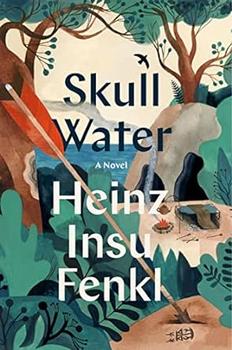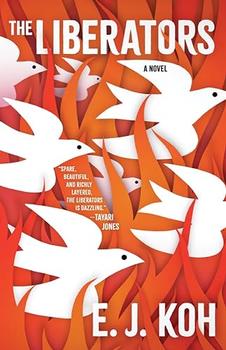Summary | Excerpt | Reviews | Beyond the book | Read-Alikes | Genres & Themes | Author Bio

A Novel
by Heinz Insu FenklSkull Water begins with teenage Insu in 1974. He is returning to his mother's homeland of Korea due to his German-American military father's redeployment, after living abroad for much of his childhood. Insu soon meets his mother's brother, Big Uncle, with whom he finds a spiritual connection that prompts his transformation into a man. Through this bond, along with the relationships Insu develops with people in the military and local community, he comes to terms with the realities of death and what it takes to seek a life that extends beyond merely surviving the impacts of war. Author Heinz Insu Fenkl interlaces Big Uncle's memories from the Korean War in 1950 with the adventures experienced by Insu and his friends at the military base in the 1970s as they grapple with accepting tragedies that befall them and their loved ones.
Mystical realism and folklore are woven into the novel, offsetting the harshness of intergenerational pain arising from war. Insu has a childlike hope in the healing power of "skull water" to cure Big Uncle from a mysterious foot injury, which sets into motion a scheme to find water from a recently deceased person's skull. The myth of this hope is slowly unraveled when Insu and his friends, in attempting to find the "cure," begin to realize the gross facts of death.
As Insu implements a plan for what he thinks will be ultimate salvation from past suffering, he comes to learn of new belief systems and realities that lead to a truer redemption. During his search for skull water, he meets monks and shamans and is introduced to spiritual and religious concepts arising from Buddhist and Taoist principles, which stand as alternatives to the linear idea of his singular mission to find a cure. Through these serendipitous collisions, Insu experiences deeper connections and epiphanies concerning the complex nature of reclaiming life after the trauma of war.
Insu comes to realize that simple black-and-white ways of viewing the world — Heaven and Earth, bad and good people, right and wrong acts — can all be inverted, especially when the violent transgressions of war have turned the world upside down. Many novels that explore war are unflinchingly brutal and difficult to read, and Skull Water is no exception when Fenkl writes from Big Uncle's perspective.
Yet the novel also explores echoes from the war through previous connections, and memories shared or withheld between families and friends. When Insu meets a woman from Big Uncle's past while fleeing Northern troops down to Pusan, this chance encounter saves Jinju, the mother of Insu's friend Miklos. Insu is able to understand his other friends Paulie and Patsy more deeply when Patsy shares details of the sexual abuse that they both suffered. Through moments like these, Fenkl introduces different ways that the war has affected people of various identities — women and girls, mixed-race and Korean children — and displays interactions between military and non-military personnel.
Skull Water is a particularly complex "war novel" in that it shows not just the events of the Korean War, but also its impact upon a subsequent generation, including racial and cultural collisions; Insu and his friends are all children of white American military fathers and Korean war brides. Furthermore, the novel touches upon the gendered violence that women suffer during war, as well as the economic implications of rebuilding a country. While Fenkl does not shy away from the horrors of military conflict, his emotionally charged and difficult read is softened by hope for the future, and the potential for healing through spiritual and religious connection.
![]() This review was originally published in The BookBrowse Review in February 2023, and has been updated for the
January 2024 edition.
Click here to go to this issue.
This review was originally published in The BookBrowse Review in February 2023, and has been updated for the
January 2024 edition.
Click here to go to this issue.

If you liked Skull Water, try these:

by Han Kang
Published 2025
Han Kang's most revelatory book since The Vegetarian, We Do Not Part tells the story of a friendship between two women while powerfully reckoning with a hidden chapter of Korean history.

by E.J. Koh
Published 2023
Extraordinarily beautiful and deeply moving, The Liberators is an elegantly wrought family saga of memory, trauma, and empathy, and a stunning testament to the consequences and fortunes of inheritance.
These are not books, lumps of lifeless paper, but minds alive on the shelves
Click Here to find out who said this, as well as discovering other famous literary quotes!
Your guide toexceptional books
BookBrowse seeks out and recommends the best in contemporary fiction and nonfiction—books that not only engage and entertain but also deepen our understanding of ourselves and the world around us.